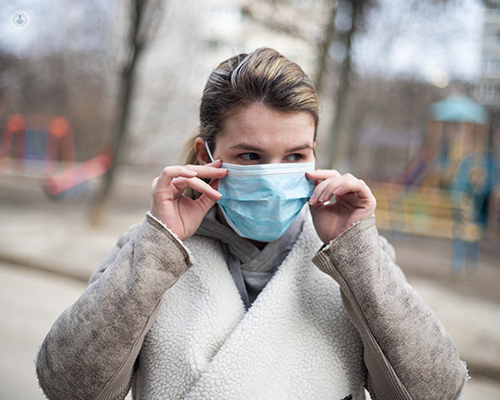Looking after your lung health COVID-19 pandemic
Escrito por:It’s well known that the new coronavirus COVID-19 has the potential to harm our bodies. Dr John Chinegwundoh is a leading respiratory consultant who has been on the frontline at London hospitals coping with COVID-19. He provides you with the answers to important questions regarding the virus and your lungs.

Are patients with lung problems more at risk of Covid-19 infection?
The coronavirus COVID-19 attacks the body in various ways. In regards to the lungs, the virus attacks the body’s ability to absorb oxygen. If you’ve been diagnosed with lung problems, you are more at risk of suffering a more severe illness due to having less lung reserve.
People who suffer from COPD, asthma, or chest problems, along with tobacco smokers, have lungs which are more susceptible to a severe case of COVID-19-related lung conditions.
How can people look after their lungs?
Whether you have been diagnosed with a lung problem or not, it’s vital that you make sure your lungs are in the best possible condition. You can do this by:
- Exercising
- Losing weight (if you’re overweight)
- Taking medications exactly as recommended by a medical specialist
If you have chest-related symptoms, such as chest pain, shortness of breath or a cough that has lasted a long time (a chronic cough ), consult or GP or specialist to check these symptoms and determine if you have a condition that needs treatment. If you have chest symptoms that overlap with coronavirus symptoms, call first. Do not enter the medical practice with COVID-related symptoms.
What happens to the lungs of people who have had coronavirus?
Covid-19’s impact on the lungs varies. In some cases, patients will have a mild illness with no long-term lung problems. In other cases, patients will have a more severe illness but their lungs will heal.
Unfortunately, some patients are left with scarred lungs and this can result in short-term and long-term complications. Follow up tests such as a chest x-ray, CT (CAT) scan and lung function tests can provide insight into how the lungs have been impacted by the virus.
Is it possible to boost my immunity against infections?
There is a wide body of evidence that has demonstrated that vitamin D is linked to the optimal functioning of the immune system. Currently, we don’t understand the exact mechanism. However, this vitamin is proving to be important in fighting off infections.
For coronavirus infections, several scientists have supported taking vitamin D supplements to reduce the risk of a poor outcome from this type of viral infection. It may be very important to know your vitamin D blood level and to take the right level of supplementation.
I’m showing symptoms of coronavirus. How do I monitor myself at home?
The vast majority of patients will experience a mild illness and recover at home. Having said this, if you have a persistent temperature or breathlessness (so much so that doing simple household tasks becomes difficult), seek medical help quickly and call a medical helpline quickly – do not visit your local healthcare centre or A&E if you have any COVID-19 symptoms (unless you have been instructed to do so over the phone).
An oxygen saturation monitor is a valuable piece of kit as it will give you an objective measure of whether your oxygen levels are getting low. If you do purchase one, check that the readings aren’t 94% are below – this is a worrying sign that signals the need for assistance.
To address concerns about your respiratory health, arrange a face-to-face or online consultation with Dr Chinegwundoh via his profile.


